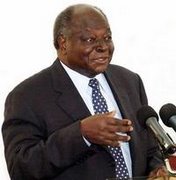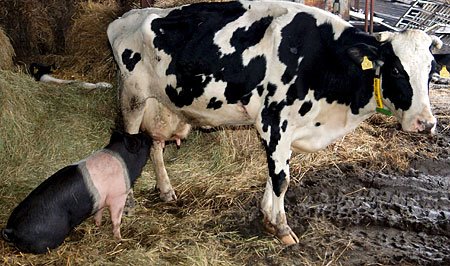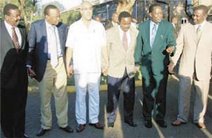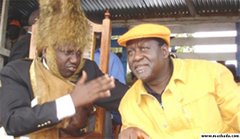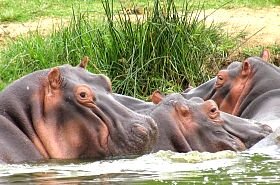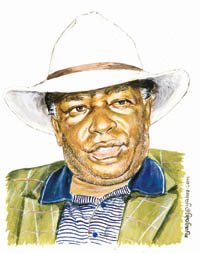The week that was The issue is not queues, it is rigging I am not about to celebrate last week's exit of queue-voting; I do not think I will do that soon।What I will do now is acknowledge the great service the President rendered Kenyans by persuading the Kanu delegates to scrap the hated mlolongo because hated it was except by the few who <-/benefitted> from it.In my view, the issue in Kenya's electoral process has not been whether or not it is the secret ballot or queue-voting. The bone of contention here is RIGGING.It must be borne in mind from the very outset that the proponents of queue-voting (mlolongoists) vigorously argued that this method would eliminate rigging. Of course, it did not, but that argument itself clearly was acknowledgement enough that there had been rigging in secret balloting to which we are reverting for Party nominations.mlolongoists also argued that queue-voting would be carried out in broad daylight, and therefore, nobody would rig the elections, but, as we all know, secret balloting is not carried out at night and the so-called daylight polls were rigged.Winners What actually happened is that Kenyans saw how elections could be blatantly and flagrantly rigged before their very eyes! A delegate at the two-day Kanu conference said that short queues produced the winners and the longer ones the losers!The Minister for Health, Mr Mwai Kibaki, he of astute aloofness, was so staggered by the blatant abuse of the electoral process in the Kanu polls of 1988 that he snapped, "at least rigging has some intelligence!"The people who rigged the secret ballot polls again rigged the so-called open-air polls or as Nandi <-/Ditrict> Kanu branch chairman, Mr Mark Too, called it, open-air democracy. There was no democracy in the queue polls in some areas; there was open-air democrazy.Of course, I had sworn never ever to stand in this thing called mlolongo, the fact that I queue at the bank, <-/Electricty> House and at the doctor's notwithstanding. I don't queue there to elect my parliamentary or civic representative, but because I do not want to be a public nuisance through bad manners and disrespect for fellow Kenyans by jumping the queue.But that queue-voting went last week is not reason enough that there will be no rigging. Who rigged the elections? We all know that the returning officers during elections are administration officials and when Kenyans presented their views to the Kanu Review Committee, they said that future polls should be handled by an independent commission.The popular view was that elections were rigged by the administration, but the District Commissioners cannot have acted alone. During his contribution to the special Kanu delegates conference last week, Mr Wasike Ndombi, the MP for Lurambi, said that the DC's talked of telephone calls from above.Where could above be? Your guess is as good as mine, but the committee rejected the demand for an independent commission to run the elections and insisted that the provincial administration be deployed for this exercise.Like Thomas, I will touch the scars to believe, I will have to see it to believe. Yes, you have got it right, I am <-/skeptical>; I am apprehensive.Why? Vote-riggers could be at work.XXXX"If you lived in this town, would you be happy if a nigger> (sic) from Birmingham came and settled down?"That is not a black-hating white American deep in the south. No, it is a stalwart of Britain's Conservative Party speaking; it's a Brit! Mr William Galbraith, is outraged that his party has chosen a black candidate to run for the Cheltenham, Gloucestershire seat in the next parliamentary elections.The nigger (sic) he is referring to is a barrister, Mr John Taylor, and Mr Galbraith is swearing that he would rather go to Golgotha than vote for a black man. "I have always been a Tory and no doubt I shall vote for the Tories again, provided they can produce a suitable candidate."Yes, Mr Taylor is not suitable. How can he ? He is a nigger. My blood is boiling and something is swelling up in my throat. I am swept into history and I am reminded of the tourists (those days they were called explorers) and missionaries who surfaced on this continent to civilise (so they claimed) and Christianise the Africans.Burden That was in the 19th century and that was the time the men from Britain descended on the "dark continent" to carry out the white man's burden of teaching Africans that they were third class citizens.This is the 20th Century which is headed for an end and some Brits still seem to believe, like the American Ku Klux Klan, that a black man is equal to two-fifths of a person.This racist bigot, whose black-hating forefathers thought the sun will never set on the British Empire, still believes in the superiority of his white skin. He sees a black man and he thinks a nightmare is just around the corner. Indeed, hell to him is the idea of a black man running in his constituency.The difference between this fellow and some other Brits is that he is brutally honest; at least his 'civilised' peers can hide their contempt for the black people behind rehearsed smiles, the ahs and ohs of wonder and the niceties of small talk.When asked by the news people about this remark, he did not deny he said it; he did not attempt to play it down. Why should he? All he said is that what he said was not meant for public consumption, but, of course, he didn't whisper in the privacy of his bedroom. And, of course, he is saying that though not for public consumption this is what he believes in.There are Brits who are still racist and paternalistic. The week that was Power-brokers: The end of an era has now begun Everybody was talking elections last week.The one thing about elections is that they are all about power and, in the African context especially, power means lording it over others, deciding the destiny of millions of people by the sheer wave of a hand or flick of a pen. This is the lowest common denominator conception of power, especially power in the public domain.In this (mis)perception of power, he who has the power wields it!But the thing is this: The coming General Election should be about the empowerment of the people; the election should be about the right of the people of Kenya to participate in their very governance; the people of Kenya should be consulted on every single idea that is bound to affect them (for better or worse) and their future.It is time for the people to decide their destiny.We have seen decisions made by a caucus of praise-singers, a gang of influence-peddlers and scheming self-seekers who look for every opportunity to sing, dance, clap, and ululate as live marionettes on a string dangling from the fingers of their manipulator.Riggers This and concepts of power-as-domination must become things of the past.It is time for the people of Kenya to use their vote to elect leaders of their choice. The problem in Kenya's electoral politics has been that of vote-cheating - rigging - and its result has been the intolerable imposition of unpopular leaders on the Kenyan people.Election-riggers and rigging must go.We have had a situation where two or three Kanu stalwarts - such as Mr Mark Too and Mr Ezekiel Barng'etuny - have taken it upon themselves to choose leaders for Kenyans. The latter confessed to such a role in Nandi District in the rigged 1988 General Election.It is time for so-called power-brokers to go. And the run-up to the multi-party General Election is the beginning of the end of the era of power-brokers.We have had leaders whose business it has been to saddle Kenyans with one sizzling controversy after another. Some have been stage-managed melodramas. The idea was always to divert attention from the burning issues of the day.It is time to elect thinking and issues-oriented leaders.We have had situations where legitimate dissent was criminalised and some Kanu hawks attempted to impose a uniformity of thought on Kenyans. These were men and women for whom the freedoms of thought, expression and assembly were to exist only in statute books safely gathering dust on forgotten shelves!It is time for the rule of law. We have had a Parliament which specialised in peddling red herrings, never addressed reasonably and soberly any issues brought before it and made empty condemnation and vilification of all and sundry its most important matters of national importance.We have had a Parliament which at no time wanted to show that it was capable of researched and reasoned debate; a House where a quorum was a rumour unless Ministers wanted to vote for a Government motion within the shortest time possible.Let us have an assertive Parliament.Kenyans have come to believe that it is their MPs who are supposed to, for example, <-/tarmack> their roads; that it is MPs who "bring development". But is that the way it should be in every material particular? Let me tell you something; some of us know the salaries of MPs.Development is the work of the Government.If there are certain areas of this country which are better developed - in terms of infrastructure, for example - than others, then the Government must explain the disparity in development. Talking about leaders who talk but don't "do anything" just will not do.Have you heard the refrain "when funds are be available"?Our economy is indeed the single most important issue to be addressed by all and sundry. There are millions of Kenyans who are unemployed. Of course it is entrepreneurs who create jobs, but the political leadership must have a vision of how to expand the economy in order that it generates jobs, improves the welfare of all Kenyans and sees the country industrialise.The economy, Kenyans, the economy.There are people who have mismanaged public funds and, year in, year out, the Parliamentary Public Accounts Committee, the Auditor-General State Corporations and other watchdogs expose these corrupt deals, but nothing happens.CommissionHave you seen the deplorable state of roads in Kenya's urban areas? Surely, that is not because there are no funds. The Nairobi City Commission, for example, collects an estimated Sh40 million every month from a certain tax with the deceptive name of Service Charge, a description that must be someone's funny idea of a euphemism.Where does Service Charge money go to?The issues are legion and cannot be adequately addressed here, but my view is that Kenyans should vote for the candidates (and parties) who address some of these as raised here.I am talking about democracy and the economy.In my view, the Presidential candidate who lays emphasis on the need to create a strong economy and shows how he intends to do this and one who invests the most premium in the unity and security of Kenyans, is the man or woman Kenyans should vote for.Kenyans should vote for people who will respect or create institutions which guarantee our democracy, promote the empowerment of the people and see Kenya take off in technology and industrial development.But, most important, Kenyan voters must kick all the rascals out! Especially the power-brokers!***Wonders will never cease, they will always increase.The National Council of the Churches of Kenya (NCCK)-facilitated probe committee into the so-called ethnic clashes came out with a report that implicated prominent people in Government, Kanu, Rift Valley-based politicians and the provincial administration.It was roundly condemned by leaders of the political establishment as inciting the public against the Government, against Kanu and trying to isolate the Kalenjin.It was said to have been brought about by a burning desire by the opposition to derail <-/preempt> the work of the Kennedy Kiliku-led Parliamentary select Committee to probe the so-called clashes.W2E012KTHE WAY I SEE IT One bottle too many is leading Kenya to ruin The way I see it is that Kenyans are becoming a sick and sickening alcohol-swilling lot. They have glorified this social beverage and turned it into stuff for a riotous national pastime.That is why I tended to agree with a committed beer-drinker who said that if you want a revolution in Kenya very fast, ban beer- drinking and free sex. It is as if alcohol is the lubricant that oils social relationships and that, without it, society's cogs will grind to a halt. Of course, alcohol can be an acceptable lubricant to a point but not when it is treated as the main one.The penetration of the alcohol culture into the lives of Kenyans is such that the phrase, "let us have one", meaning, "let us go and get drunk", rolls off tongues as easily as "let us have a cup of tea". Of course, there are great differences in the composition of the two liquids because one has the tendency to play games with one's imagination while the other makes it steady.Lots of times, a telephone conversation goes on like this on a Monday afternoon: "You're very lost ... Really? ... I thought you had stopped drinking ... kwani where do you swallow? ... Oh, that joint? Me, I'm still faithful to the old place. It's a crawling distance from my house, you see. ... Today? Of course, we can meet there ... No problem. I have a hundred and I'm sure you have two to return the hand ..."That having been said, the two Kenyans will meet and have what will turn out to be an evening of many drowned bottles. Remember that is happening on a Monday and the following day is a Tuesday and not a public holiday. Remember also that nobody has even discovered a cure for hangovers and that when one is suffering from the over indulgence of the night before, the head tends to behave like a rock by resting lazily on the shoulders and being hostile to thinking.The culture of "let's go and have one" is justified in all sorts of ways. There are those who, like the Latins, say, in vino veritas. That is, in wine there is truth or something related to that. Those who use that argument say that there is no better way of oiling a relationship than in an imbibing session where all hangups are banished by the intoxicating liquids. The tongue is loosened thus the mouth says what is in the heart. The only trouble in Kenya is that we have made that process of loosening tongues with wine too regular and by using too much alcohol for the purpose. For us, it is a never ending process.For men, the guise of being responsible wealth hunters wherever it can be found, be it on rooftops or under the sea, comes in handy when justifying being in the bar and <-/overdrinking>. They posit that it is only in those places that they can make important contacts and therefore clinch mighty goals.Thus you will hear a man tell his wife: "Do you imagine that I shall ever get a plot to build on if I sit in the house and drink tea with you? No, I can only get that plot if I meet my fellow men. My fellow men are normally found in bars and not in the church so swallow I must swallow."More often than not, there are no deals about plots but evenings of frenzied drinking and plots on how to keep women in their supposed place.Fridays offer what is posed as the inescapable excuse for drinking beer with reckless abandon. The day is endearingly called "Members Day", that is, the day to drink beer by the barrel.Come lunch hour on that day and meat is eaten as if there will be no goats tomorrow because, as they say, "you have to build gabions" ready for a major drink later in the evening. After office hours, all throats head for the bar.With stomachs so fortified, those celebrants of the "Members Day" will compete to drink bars dry and then, as they nurse their hangovers the following day, they will happily narrate their exploits. They will do so because there is supposed to be heroism in trying to drink the entire brewery.Thus you will meet a Kenyan, his bloodshot eyes bulging as if they are threatening to jump out of their sockets, his head veins looking as if they will burst any time and generally looking as if he is ready for the mortuary and he will proudly say: "Chief, I swallowed last night. No, it was not last night. I mean until nearly this morning. I swallowed beer and all its children. First it was at Rienye's where we started with a roast and beers. "After harassing so many beers at that place I felt that my stomach was just getting full and nothing in my head was changing. So I moved to Ngop. There I decided to deal with the stuff from the land of Gorbachev, that is Vodka itself. I tell you, I must have swallowed what would knock out a tiger"Another one who, perhaps, cannot hold his drink up to the end, will proudly talk about how he nearly killed himself. After a night of hard drinking, he will say: "I tell you, bwana, last night I swallowed so much that I could not tell my nose from my leg. As a matter of fact, I don't know how I got home. I just found myself in bed and the car parked outside. It must have driven itself home because the last thing I remember is dancing near the jukebox."There are even those who admire other Kenyans who are said to have throats that can resist fire in the name of drinking. I have heard a Kenyan say this: "I tell you that Kenyan is tough. He can swallow a whole bottle of whiskey and still get home to his wife in one piece. I just don't know how he manages to be so tough. I wish I were like him!"If you are known to be a beer-drinker and you excuse yourself too regularly from the bar orgies, friends start to think that you are a traitor who has betrayed the drinking brotherhood. Others will even say: "WM is sat on by his wife these days. He gives his wife all his money together with the payslip so that she can verify that he has not spent any. She is the one who controls what he spends. I really don't know what has come over him."Perhaps this beer-swallowing culture has something to do with the structure of the whole society for we live in one that is pulling down the barriers of permissiveness. We are kind of engendering a society that believes in making merry all round little caring about the side effects of the "laughing gas" that we are using to make ourselves happy.Kenyans are also making themselves too happy with alcohol because it is freely available. Go to the smallest town in the country and you will miss a butchery, a bed to rest your tired ribs on or a regular supply of soap but you will have enough beer to drink. Most rural towns have what can be identified as beer belts - a street dominated by bars.In Nairobi, bars pop up everywhere in the residential estates as if it would be against the law not to let people get drunk.At the same time, the reckless beer-drinking definitely has a lot to do with the fact that meaningful recreation facilities are lacking in community settlements. The drudgery of going home every evening, seeing the same people there and being tortured by a television station that is pain to the eyes and ears makes drinking a very attractive prospect.Community social halls where people used to gather and watch television and theatre particularly in Nairobi's Eastlands no longer serve that purpose. At the same time, now that television is no longer novel and offers nothing really worth talking about and theatre is mistaken by the authorities as a tool for subversion, those halls might not attract the crowds they used to.It is a pity also that as residential estates continue to spring up in the city, no such halls are built any more despite the fact that they could be used for at least indoor games, a diversion from alcohol.The ultimate and painful truth is that it is the most productive generation (25-40 years) that is drowning itself in alcohol and consequently killing itself. A generation of people with cracked livers has never made a nation yet that is the kind of people that the bar culture is creating.We owe ourselves and others the virtue of controlled beer-drinking otherwise we shall all kill ourselves through our own choice.The way I see it then is that having one too many for the road paves the road to ruin. THE WAY I SEE IT Our nation suffers when we propagate tribalism The way I see it is that, any Kenyan who thinks that tribalistic jingoism can redress past real or imaginary ills, is merely wishing destruction upon himself, his people and the nation.That is so because tribalism in all its manifestations eats into the very fabric of society, saps its self-sustaining juices and leaves gangrenous rot - the last of the steps in the collapse of the management of the nation-state.Let tribalism not be confused with ethnicity or the peculiarities of a person's coming from a certain region in Kenya, speaking a specific language, eating specific foods, dressing in a manner peculiar to the tribe, observing taboos prescribed by the tribe and doing whatever else that pertains to the mores of his ethnic group.Cultural traits One did not choose where to be born. I was born on the slopes of Mount Kenya, you were born on the shores of Lake Victoria, another Kenyan was born on the shores of the Indian Ocean, yet another in the heat of the Turkana desert. By virtue of being born in different places without choice, we grow up adopting the cultural traits of the particular ethnic group in which we were born.There is no crime or moral perversion in identifying with one's cultural background. That is why I agree with Chinua Achebe in his book The Trouble with Nigeria that, "Everyone agrees that there are manifestations of tribal culture which we cannot condemn; for example, peculiar habits of dress, food, language, music, etc. In fact many of these manifestations are positive and desirable and confer richness on our national culture."What then is this beast called tribalism? I will go by the definition given by the Parliamentary Select Committee on Unemployment some years ago as quoted by Professor Mbithi in his book Rural Sociology and Rural Development: " ... a person given to tribalism sees all issues in terms of tribalism.
Examine that statement against what a certain leader said recently. He was talking from the point of view of an arbiter who cannot dispense fairness since he starts from the premise of the tribe above anything else.The scary scenario which could erupt from that kind of statement is what the Parliamentary Select Committee described as "counteraction," that is, the ethnic group being accused of robbery reacting in its own manner to the threats of being "silenced" and being made to "lie low like an envelope".The group that is being threatened (God forbid that it ever happens) could decide to say: "Why do they think that it is only us that can bleed? They should also know that they have blood and we could make them bleed." W2E013KBOUQUETS & BARBS Kill this booming silence from the fount of policy It is unbelievable that Kanu headquarters has remained silent as (respected) leaders cause an uproar with remarks which, ultimately, are a glorification of tribalism - defined in this context as a crude appeal to tribal sentiment and exclusivity for purposes of denying other groups access to national resources (read land) and business opportunities.The latest to affirm that he remains devoted to those who would like to see this country split into "tribedoms" is Sharif Nassir. He comes in for a barb because, rather than discard his tribal argument, he reiterated it by asking "aliens" in Lamu district to leave the place for the indigenous peoples. But his utterances really are not the issue here.They are only relevant in so far as such statements are being made while Kanu listens and says nothing. The secretary-general Mr Joseph Kamotho, has criticised the statements but not in his capacity as the party spokesman. It is curious, to say the least.Those familiar with the party manifesto will attest to the fact that it does not promote tribalism, nepotism, corruption, etc, etc. Over time, there have been many statements made to reinforce this stand. This consistency has been admirable until now.Senior politicians - some of them known to wield substantial clout - have taken to making statements which are neither well-intentioned criticisms nor feasible solutions to the problems the leaders are complaining about. In other circumstances, these are leaders who would be expected to deliver the party line on matters of policy.But since you and I know that they are not, why is the authority which legitimises their positions of authority and, by extension, validates their statements, not issuing some guidance? A caution maybe, or a clarification of sorts about what we are hearing. Whatever form it takes, an official statement addressing this matter specifically is definitely called for.I need not remind you that people have been punished by the party after being found guilty of relatively minor offences. It does not reflect well on the party to leave itself open to accusations of double-standards, and that is why it suffers a major barb this week.Caning people to a dead end Some security officers come in for a big barb this week for the heinous act which they perpetrated against two Weekly Review reporters last Sunday, at a function organised by the Minister for Energy Mr Nicholas Biwott. At the function, Mr Macharia Gaitho and Mr Julius Bargorett were frog-marched out of Mr Biwott's baraza, locked up in a room, whipped and told to disappear from the vicinity.It beats reason that at this time and age, after so much has been said and written about the role of journalists, when most people - at least the literate and responsible - appreciate the extreme difficulties under which third World journalists operate, such a primitive exhibition of raw brutality against professionals doing their jobs can be encountered.It is just one more incident in a long line of embarrassing instances which contradicts every claim that we may make to being enlightened, tolerant and knowledgeable - in a word, civilised.Past experience and dictates of professionalism - let alone the embarrassment for such an admission - convince me that the two journalists are telling the truth about their hair-raising experience. Minister Biwott and his guards may not have seen the incident, but that does not mean it did not happen.Since there is no plausible explanation for the animalistic behaviour of the guards, I can only guess that they felt the Minister simply did not wish for coverage - highly unlikely for a politician - or that they knew something which they wanted covered up. The question is: What?We may never know and guessing, as you know, is a dangerous game. Suffice it to say that such barbaric incidents form the juicy stuff of which this country is criticised out there. It was an indefensible act, a telling statement on the evolution - or is it retrogression - of our political establishment for which the guilty suffer a giant-sized barb.They hang on despite chaos The bouquet today goes to the doctors, nurses and other health officers who continue to provide services to the sick within a most unsatisfactory and demotivating environment. If you have been up with the news this week, you may be familiar with what I am talking about.Many doctors and specialists at the Kenyatta National Hospital barely practise because most of the expensive, and not so expensive equipment at the hospital is not serviceable. Erratic supplies of standard, inexpensive but vital items like surgical gloves have grounded a number of urgent operations. Sometimes the doctors do not even have paper on which to prescribe drugs. It is a truly appalling situation.But the dimensions of the crisis extend beyond KNH to virtually every public hospital in the country. Shortages of working tools, neglected equipment and infrastructure, shortage of drugs to prescribe, etc. have turned these medical institutions into the most frustrating places to work.But the doctors and their support staff plod on, not because they must, but because they owe it to the patients and to their calling. Having to make do with the barest of resources has made many of them masters at improvisation - conjuring up alternatives out of hopeless situations. The doctors may not save all lives that would otherwise have been saved, but they certainly retrieve many that would have been definite goners.Their selflessness is a bright spot in a continuum of grey and black, a brilliance one hopes will light up the way for many able people who see in life only a chance for themselves to advance, and in people vessels to be exploited. For their sacrifice and diligence, crews in public hospitals walk off with the bouquet.Shut out these cries of war Sudan's leadership comes in for a barb this week for its apparent intention to pursue the military option in resolving the long-running conflict in southern Sudan. A reported string of victories against the seccessionist rebel group - Sudan People's Liberation Movement - led by Colonel John Garang seems to have convinced Gen Omar el-Bashir's group that the uprising in southern Sudan can be crushed.I would like to disabuse the General and his people of the notion that they can discount the SPLA so easily. Any such thinking ignores the lessons of the history of this particular conflict, and of others elsewhere. The southern Sudan problem is more deep-rooted than Gen Bashir may believe.It is not merely a question of the mainly black, animist south rejecting the rule of the fair-skinned Arab-dominated Islamic north. It is a conflict which has to do with the development of a collective national identity, sharing out national resources as equitably as possible and respecting the dignity of all Sudanese.Even if the government troops were able to crush the SPLA, it would be a temporary victory because the campaign will continue. Even if not immediately, then later after the vanquished regroup and draw new strategies. May I remind Gen Bashir that this conflict has been on and off for over 30 years.The Khartoum government would be better advised to drop its jingoistic stance and pursue dialogue. Governments which preceded the present one fell, partly because they were unable to sort out the southern Sudan mess. Unless Gen Bashir wants to go the same way, he should act like an enlightened statesman.Africa has too many leaders who imagine they can solve everything by the barrel of the gun. It is a misguided approach which hurts their countries more than the individuals. the General and his people earn a barb for exposing these traits which will never bring any succour to Africa. BOUQUETS & BARBS Honesty: one little word that makes a difference Mwai Kibaki, that urbane, extremely competent technocrat and agile politician has become famous for his unique contribution to Kenya's development and rare ability to come out on top of tribulations which would deflate lesser men. He is quite fearless too.This week, he comes in for a bouquet for exposing , yet again, another admirable facet of his character, and one which is increasingly difficult to find in many local politicians - honesty.Lately, there have been several press reports, extensively detailing the rot in which many of the local health institutions are mired in. The decrepit New Nyanza General Hospital (also referred to as Russia Hospital) in Kisumu, was singled out for particular censure, in this instance by a write-up in the Kenya Times.In keeping with the tradition that all of you readers should be familiar with by now, a politician, Mr Miruka Owuor, who represents the Nyando constituency, came out strongly against the newspaper which he accused of "alarmist reporting" about the hospital. But in this, as in almost every other instance that the media has been criticised of misreporting, the Press was right.And we have Mr Kibaki to thank for this. Following the report, he toured health facilities in Nyanza Province - including the hospital in question - and verified that the media reports were factual. He said as much.It was true that the hospital was a shambles, it was true that it was teetering on the brink of collapse, true that its mortuary was in a pathetic state. Almost every department and facility within the institution was wanting in some way. That is what had been said in the media and Mr Kibaki verified it.His action is commendable for its own sake. It is also commendable because it brings into extremely sharp focus the more common, dishonest, bumbling attempts at deception and cover-up which we have learnt to expect from most of our politicians. Had Mr Kibaki not gone to Kisumu, Mr Owuor's misleading statement would most probably have won the day.Regrettably for the health of local politics and the development of this country, half-truths and flagrant distortions of truth have virtually been institutionalised. Politicians will deny the existence of a disease epidemic, the shortage of an essential commodity, the incompetence of a public institution, etc, when such an issue is beyond debate.By doing this, they have abetted crime, sabotaged efforts to improve the delivery of services through criticism, and misled multitudes of credulous wananchi who take most of what the leaders say as gospel truth. It has become so prevalent that it has, counter-productively, bred a dangerous cynicism in those who can see through the lies. It is a cynicism which makes them disbelieve the politicians even on the rare times that they may be telling the truth.It is futile to remind them at this point that honesty and justice are inseparable, that they cheat themselves more by misleading the public, and that at this point in time, many people may listen to what they say but only a handful believe. Mr Kibaki is clearly aware of this and he gets a bouquet for not trying to insist that black is white, just because he wants it to be white.Different view over the sackAnother bouquet goes to the handful of people who, publicly or privately, have raised this question: To what extent have workers in the private or public sector been kicked out of their jobs for reasons other than incompetence or gross insubordination? In other words, how often has the threat, or the act of sacking been precipitated by reasons other than the purely professional?I do not <-/>not know, but I think it is a significant question particularly at this time when the debate on the efficiency and effectiveness of parastatal and other public institutions is raging.Often, if not all the time, the public has assumed that when an individual is sacked, particularly from a responsible position, it is because he did not perform competently. He either made an indefensible management decision, stole money or did something else equally unacceptable. W2E014KOf bandits and Ministers who know nothing at all If a number of legislators are to be believed, Kenya is sliding fast into the law of the jungle where highway men are free to rob and murder citizens without the fear of ever being apprehended.This is not an overstatement as banditry in North Eastern, Coast and Rift Valley provinces would testify.Legislators Philip Godana (Moyale) and Ali Bujra (Lamu West) spoke this week as if bandits had seized the initiative from the security forces.They felt that most of the insecurity problems facing the country were self inflicted since the Government had kept the Somali-Kenya border porous, thereby allowing armed soldiers, spies and all types of <-/desperados> from Somalia to find sanctuary here.Mr Godana said that on Wednesday alone, seven Boran women were murdered in cold blood by some Somali refugees from a camp near Moyale town.He said the refugees had heavily outnumbered his constituents and had taken over all social facilities, including grazing lands.Mr Bujra had a similar story to tell about Witu town which had been ransacked on three occasions by heavily armed bandits.An Assistant Minister for Livestock, Mr Peter Nang'ole told the House how more than 600 heavily armed rustlers dressed in military uniform raided a location in Kacheliba and overpowered Administration Policemen based at Kiwawa location before disappearing with more than 1,300 head of cattle.Apart from security issues, nothing else was inspiring or noteworthy about Parliamentary debates this week.Even Question Time which is normally the liveliest period during a sitting appears to have degenerated into a routine affair where nonsense is sometimes given in response to questions of considerable importance to the public.The lethargy is not merely confined to Ministers, a number of whom excel in giving un-researched answers, but also to some MPs who submit controversial questions but for some reasons fail to come to the House to ask them after they are listed in the Order Paper.Some of the questions listed this week touched on sensitive issues of great concern to the people but the Ministers who were supposed to respond either gave scanty information or the questioners after having cold feet decided to duck the session.Half-baked answers given by Ministers or their assistants for that matter, expose them to ridicule on matters they are supposed to have first-hand knowledge of.Take, for instance, the question asked by the Ijara MP, Mr Nasir Arte. He asked an Assistant Minister in the President's Office, Mr David Onyancha if he was aware that 4,000 head of cattle were stolen from Kotile Location, Masalani Division, Garissa District in May this year.Mr Arte said the stolen animals were driven through Garsen bridge which is guarded 24 hours a day by the security forces.Mr Onyancha was obviously poorly briefed by the civil servants and when questioned closely, he appeared to be completely at sea. He looked ambushed, hemmed in and surprised with each question fired at him by Mr Arte and other MPs from North Eastern Province."Do you know that vehicles transporting some of the stolen cattle to Nairobi were given police escort? Do you know the number of livestock so far recovered or should I tell you?" Mr Arte mercilessly bore on.Speaker Jonathan Ng'eno noticed the tricky situation in which Mr Onyancha was and decided o end his agony by ordering him to carry out further investigations into the allegations made by the MPs.Sometimes, Ministers take a bashing for no fault of their own. A civil servant may withhold information or mislead his, Minister n order to protect a malefactor or to <-/coverup> a scandal.In most cases the MPs already know facts surrounding a case before asking questions and through consistent probing sometimes make a Minister look stupid and incompetent.When cornered this week, two Assistant Ministers for Education, Mr Fred Omido and Mr Mathew Karauri abandoned a tradition of defending Ministries regardless of the enormity of accusations levelled against them.Mr Omido stopped short of accusing his Ministry of inefficiency. He frankly admitted that some officers were thoroughly inefficient. He said he was unable to reply to a question because an officer who had promised to deliver a reply directly to him at Parliament failed to turn up.When Mr Karauri was faced with the same dilemma, he said he wished he had the power to discipline some of the unbecoming Ministry officials.However, not all MPs have sharp wits and some after raising fundamental issues, fail to get to the truth through asking pertinent supplementary questions. Others are upstaged by crafty Ministers who reply glibly to questions without ever committing their Ministries into doing anything.Some questions literally become still-born after the MPs fail to ask them once they are put in the Order Paper. This is despite the fact that MPs have the option of instructing their colleagues to raise questions on their behalf. This week several questions went unanswered and the most vivid example was that of the capricious Molo MP, Mr Njenga Mungai.He was to ask the Minister for Environment and Natural Resources if he was aware about people who had moved into Nessuit and Marashioni forests and were now living there.Had the Government then reversed the policy of not allowing people to build houses or settle in gazetted forests, he was to ask.Mr Mungai claimed that these people had enrolled their children in schools formerly used by forest workers and squatters. He was, therefore, to ask if former squatters would be compensated since they had built most of the schools on a Harambee basis. But he never came to the House to ask his question.Despite this seemingly half-hearted interest in Parliamentary proceedings, a resurgence of self-confidence could be detected among the legislators.Buoyed by the total confusion and internecine fighting in the opposition camp, the legislators have been talking with growing confidence that Kanu would win in the coming multi-party elections.Some months ago, when the opposition was wallowing in euphoria and over-confidence, very few MPs could muster the courage to identify themselves with Kanu.But today, even legislators considered liberal such as the Changamwe MP, Mr Kennedy Kiliku and Mr Njenga Mungai have openly reaffirmed their total support for Kanu. The Kibwezi MP, Mrs Agnes Ndetei declared that the majority of Kamba are solidly behind Kanu and President Moi.The feeling is that little is being heard of the DP while FORD is on the way to the sewer.But politics being what it is, Kenyans could be in for a few surprises in the coming months. Kikuyu debate dims hopes on truth ever coming out If one had any illusions about Parliament unearthing and censuring the authors of the recent politically-instigated ethnic clashes mainly in the Rift Valley Province and Western Kenya, then the volatile debate on the Kiliku Report should have dimmed those illusions.Mr Kennedy Kiliku (Changamwe) and his team who spent nearly four months interviewing nearly 850 witnesses and compiling the Report have been subjected to criticism and even insults by those named in the report and their supporters.Listening to the debate on the Report, it would appear that the spirit of multi-partism which, essentially means tolerance and accommodation, is still academic to most legislators who still live in the past.It may be expecting too much to hope the legislators will adopt the Report but the least they can do is to stop disparaging individual Committee Members and personalising the Report.One can only hope that an overwhelming negative vote on the Report will not mean the end of investigations into one of the most diabolical violence ever unleashed on innocent citizens.A number of legislators mentioned adversely in the Report have vehemently denied being involved in any way in the violence without explaining why they and not others were mentioned.Some would even like Kenyans to believe that it was the opposition, mainly FORD and the clergy who instigated and financed the clashes.But if this was true, why didn't the Government arrest even a single opposition figure or clergyman in connection with the violence? Why did the security forces dilly-dally in their endeavour to contain the violence?If the Government was able to arrest the underground Mwakenya Members, it would not have been difficult to swoop on the warriors and their paymasters who were operating above board.One of the Report critics, Mr Kalonzo Musyoka (Deputy Speaker) strenuously defended the advocates of majimboism (federalism) and went ahead to denounce American Congressman Joseph Kennedy II for linking the Government with the clashes.Mr Musyoka quoted the following extracts from Mr Kennedy's submissions to the Congress as some of the utterances which infuriated him most:"Too many Kenyans have died in vain. The Moi Government would like us to think that inter- ethnic rivalry is the cause of this violence but there are unmistakable signs which suggest the violence is part of a carefully orchestrated campaign by the Government to forestall openly-contested elections and to ensure that President Moi continues his strangle-hold on power."The recent interception of a shipment of arrows that were imported by a company owned by President Moi's son is strong indication that the Government aids and abets violence in Kenya."Exclaimed Mr Kalonzo: "What a shame! It is a shame because we know it differently. What untruthfulness!"He submitted that the clashes were the work of international spies and secret agents.Whatever may be surmised of Mr Musyoka's contribution, he portrayed a humanitarian gesture by expressing sympathy with those whose relatives were killed in the clashes or had their property destroyed or looted.The inflammatory and intemperate speech made by an Assistant Minister for Planning and National Development, Mr Noor Abdi Ogle, on majimbo showed what a dim view he had of the Constitution.The Constitution is unequivocal as to the unitary nature of the Kenyan nation. Section 1 of Chapter 1 of the Constitution declares: "Kenya is a sovereign Republic."Mr Ogle's majimbo remarks were reminiscent of the slogans of the leaders of the Shifts secessionist movement of the early sixties.The Assistant Minister began his contribution by declaring that the Report was in tune with the opposition's malicious attempt to tarnish the name of prominent Members of the Government and by extension, the Government itself and turning Kenyan communities against one another.He claimed that the FORD Agip chairman, Mr Oginga Odinga and the DP chairman Mr Mwai Kibaki just went to advise the committee on how to write the Report and implicate persons they thought should be implicated in this serious matter.Mr Ogle then dropped the bombshell: "I was a proponent of majimboism and I still am. Whatever might have been said against majimboism, some of us are able to stand up here and say that we are unrepentant advocates of majimboism."The Assistant Minister, who equates majimbo with democracy, may do well to understand that democracy is a political terminology while majimbo is a secession terminology.Challenged by an Assistant Minister for Tourism and Wildlife, Mr Zachariah Gakunju <-/OM> that majimbo meant disintegration of Kenya as a unitary state, Mr Ogle retorted: "Some of us tend to cling to the old illusion, that they have the exclusive rights of opinion in this country."Even at this moment in time, Shariff Nassir (Mombasa Kanu Chairman) does not believe in multi-partism and believes that the repeal of Section 2 (a) of the Constitution is solely to blame for the clashes.Mr Nassir told the House this week that multi-partism was introduced rather abruptly to a people ill-prepared for it. All <-_what><+_that> the people can do now is to fight one another over political parties, he said.Turning to his pet subject of a bloodbath, Mr Nassir said: "I have never seen such a dangerous Report which could make Kenyans to spill blood as this Kiliku Report."An Assistant Minister for Livestock Development, Mr Reuben Chesire, said Parliament should not only reject the Report but should order the destruction of all copies of the document. W2E015KTopical Commentaries Try this Hong Kong deal If you have access to cattle carcasses, you may be able to make some extra money.According to reports landing on my desk, a Hong Kong businessman, K.K. Poon is willing to buy all the cattle gallstones you can supply. The gallstones the businessman is after are found inside the gall bladder (a small sac attached to the liver) and are needed for research projects.His latest quotation is sterling 5.70 (about Shs 249) per gramme paid on any international currency!The reason Mr Poon is willing to pay such a high price is that for over 2000 years, gallstones have been used as material for producing Chinese medicine for controlling fever with similar effects of antibiotics.Mr Poon who says they have been buying gallstones throughout the world for more than 40 years cautions the would be exporters that only a small percentage of gall bladders actually contain stones, so you need to open each bladder and check.According to the release, the stones are usually golden brown in colour and clay-like in appearance. In size, they can vary from a small bird's egg to a hen's egg.You need to handle the stones gently as they break easily, and they are worth more when they are unbroken. Remove the stones and let them drain dry. This should be done in a freezy spot, but out of direct sun - which can cause the stones to turn black making them less valuable.He says don't put the stones in contact with cotton wool or tissue paper to dry them while they are still wet, or else the fibres will stick to the stones and reduce the value.When dry the stones should be tightly packed for posting. Ideally, they should be in a plastic bag, inside a small tin lined with cotton wool or tissue paper. The idea is to stop the stones from being crushed and from rattling around and being broken.Send as little as one ounce (28.35 grammes) at a time. Tape up the box and post by registered airmail and make sure your name and address are clearly on the package - so that you can receive payment for the stones.Mr Poon says that on receipt of a package all the packing and any valueless material are removed. Just the gallstones are weighed.Prices of stones have been pretty stable for the past few years, according to the businessman, but if prices should have increased he will pay more.<-_Payments><+_Payment> is made in American dollar bank drafts or any other currency which the sender specifies. Well, if you think you are in business send the gallstones or write for more information to K.K. Poon, P.O. Box 71460, Kowloon Central Post Office, Hong Kong.Topical Commentaries Highly priced bridegrooms At a recent church sponsored seminar, it was reported that many male Kenyans are turning away from the marriage institution particularly where weddings are demanded. Reason, because of the brideprice. My own research also found that Kisii ladies have become among the most expensive due to the brideprice, tag placed on them by their parents.Well, I have some tips which may be useful to young Kenyans who still have faith in the institution and who may not have identified their potential brides. I would not like to disappoint brides already promised a wedding ring.Try South Korea. Here they will not pay brideprice instead they will be paid bridegroom price. Although this practice is in several other countries in Asia, South Korea could be likened to Kisii but in a different sense. In South Korea the bridegroom price has gone up so much that the value of an average dowry paid to the male is about Shs 2,000,000 in addition to gifts to the man's parents of almost the same amount.Ladies, do not hate me for this, in fact this advice is meant to help you. You can use this for a serious pep talk with your parents pointing out that if they do not review their brideprice downwards, you may stick at their homes while Kenyan males shop in South Korea. A recent report by AFP <-_attest><+_attests> to my findings.An increasing number of South Korean brides are facing broken marriages or cruel treatment from their husbands and mothers-in-law for not bringing dowries worth tens of thousands of dollars.Of the estimated 300,000 marriages a year here, one in three ends with the bride leaving or chased out by her bridegroom, often over the dowry issue.The problem was raised at a recent seminar organized by the Federation of Feminine Movement Associations. Topical Commentaries Who needs this noisy music? MATATUs will never cease to upset Kibao and it is not because - as some people have maliciously alleged - he cannot afford to own one. No, he has learnt to endure pecuniary malnutrition as an unappreciated hack.It is just whatever disciplinary action is taken against them, they revert to their bad old ways as soon as one turns <-_his><+_one's> back.Remember the vigorous campaign to get rid of cacophonous and <-/distructive> music from matatus. It was conducted by J.J. Kamotho and other party stalwarts reinforced by uncompromising APs and youthwingers, in the aftermath of Muoroto.The aim was to get rid of public airing of `subversive' music which was undermining party unity and <-/pastriotism>. Apparently the campaign was a success since the party cadre has turned away from that task to other <_/endevours> of political activism.But as soon as their backs were turned the music came back. Whether the `subversion' has been purged is another matter, but the noise is certainly there. You only have to be in a lane alongside a matatu and your ears go buzzing with drumming and other discordant sounds.Kibao does not really mind if some people want to puncture their eardrums. It is said there are people who would not board a matatu that does not have a cassette player blazing away.It is the result of such distraction that he abhors. For one, the matatu driver is invariably a participant in the music show and gives it more attention than the road. The result is the rising statistics of death on the road.For another, the music is still being used to lure schoolgirls to unknown destinations during the idle hours of the day when the commuter trade has slackened off.If Kibao was to be asked, the playing of music in matatus is still as great a menace to society as it was when the `subversive' discs were doing the rounds. Topical Commentaries Communicating with the menu Pressure of work nearly got me into trouble yesterday. It was perhaps due to the sixth sense or the value I sometimes attach to my life that saved me.The pressure of deadlines often lead journalists to feed on junk food, a factor that employers should look into seriously and work out some form of compensation.So there I was yesterday, determined to improve on my junk diet and accordingly rushed to some middle class restaurant in Nairobi for a quick lunch. One advantage about middle class <-_restaurant><+_restaurants> is that one can communicate with the menu. But in the high class hotels, beef from Dagoretti market assumes, often a French name once it has passed through the hands of a chef. In one occasion I almost fed on snails thinking it was spinach.So to save time consumed making out whether one is likely to feed on snails and spinach, I went to one of the restaurants situated on University Way where it is said as it is on the menu.And here the idea of goat ribs, chicken legs, irio and genuine spinach all for me in one dish at less than 70 shillings was promisingly fulfilling and it was <-/apetizing> until my <-_meals><+_meal> was served within five minutes. I loved the efficiency. I had hardly picked up my fork and the rest than I realised that the goat meat had <+_a> foul smell . The cook (in these restaurants they don't employ chefs, they employ cooks) who prepared the meal and the waiter who served me must have had some flu which comes with <+_a> blocked nose to have failed to realise that they were serving me with bad meat with a strong foul smell.Luckily another waiter concurred with me that the meat was bad but that was not much of luck as I was asked, a question similar to the ones I have been asked in few occasions in bars when I am served with stale beer, "what do you want us to do?"If I may digress a little, I have quit drinking cold beer in some places having learnt that their attendants fill up empty bottles with the drinks from <-_bottle><+_bottles> which could not be fully drained by boozers. In so doing they make double profits. That is by selling what has already been paid for though not all drained.So when this question was addressed to me yesterday, I gave my model answer. You see, experience, as they say is a good teacher and from my experience I know what the follow up questions and contentions would be.I told them to give me the bill and I paid then advised them to inform their cook that if they were dealing with some other person, hell would have broken <-/lose>, "you see you happen to be dealing with a gentleman", for which the two waiters I was then addressing heaved a sigh of relief and gave me the chorus "Thank you thank you, thank you."In some bars, the attendants would even insist that an obviously stale beer is not stale and I have come to the decision that in the absence of active consumer protection, it is better to ignore what one spent buying a meal or beer than to consume bad food and end up with some food poisoning problem. Topical Commentaries Hoarders are at it again Kenya's greedy shopkeepers and hawkers, notably in Nairobi, are at it yet again; and one wonders why they are apparently hoarding certain brands of maizemeal and sugar, trying to blame it on the ghostly distributors.Making spot-checks in parts of the city the other day Kibao and his "gang of four" hawk- eyed fellow reporters could overhear housewives complaining bitterly, saying that even safety matches were now selling at 25-30 per box of less than 40 sticks.Many of the Eastlands shopkeepers told newsmen that they were hoarding nothing, claiming that probably the distributors were going to hike prices "since Kenya was becoming a lovelier land of price decontrols".Asked why she was allegedly "reserving" packets of sugar under the counter for a select few of her customers, an arrogant woman told newsmen in the Buru Buru area: "They are my regular customers and I'm not going to be intimidated by yourselves or by any daughter of another "B". And by the way if you try to take any pictures here, you'll go back to wherever you came minus those shining teeth - and please get out of my shop ...!"An Asian grocer in another part of the city was better behaved for he told my colleague Charlie: "Ever heard of mini-budgets? The only money you fellows have in abundant circulation nowadays is for booze and vice. How can I tell you're not another thug, yourself? Two of your friends came in shortly after we opened for business, emptied that cash box, spat on my son, floored me at my advancing age, and just walked away as if this was their Dad's shop"."Have you reported to the nearest police post?" The trader was asked by Charlie and he replied: "No. I don't have all that time required for being quizzed, making statements and ..." Asked for comment on the on-going hoarding, a minor government functionary told our metro-editor: "They're merely creating artificial shortages but we'll catch up with some of them". W2E016KReflections Women leaders don't speak for women Were I to choose between Grace Akinyi Ogot the writer and Honourable Grace Ogot the politician, I would easily go for Lady Ogot the writer and country woman. As a writer she understood her world and spoke for many - men and women - she had a social purpose and championed a cause.Her sympathies, for example, in Land Without Thunder, one of her books, were with the oppressed woman., Oganda who must be sacrificed for the whims of male gods to bring rain to a dying generation. The decision to sacrifice this young woman was made by a group of elders - all men.The traditional world in which Lady Ogot grew up is a bastion of male chauvinism, a world that denied women the right to independence, excellence and respect. It is a world in which men hold the knife and the pumpkin, as they controlled the destiny of women. It is a world past and a world present.Such was the context that gave Dr Maria Nzoma's thesis credibility, and such is the world former Kenya Times editor, Philip Ochieng, <-/hiped> on. It is world of gender imbalance so much under scrutiny today in most parts of the world.Why should our place be an exception? Why should anyone feel offended when such critical issues are raised? Nzomo and Ochieng are only being true to forces sweeping humanity - forces of freedom, independence and fair play.They are questioning, as many have, why more than half the human race should live under male subjection - alienated from policies and decisions.If women were to be equal partners in the development of humanity and our own nation, then something should be done to address the status quo.Although in our own time much has changed in gender relations and women are influential citizens they are influential only behind the scenes.As admitted recently by leaders of Maendeleo ya Wanwake in their belated response to what they call unprovoked scheme to discredit women leadership, women are inconspicuous.They say the woman partner plays a major advisory role behind the scenes. By their own confession, these leaders subscribe to the notion that women should rather be seen but not heard. They are enveloped and engulfed by men bred in the old conservative style at loggerheads with modernity.These are the men who will stand in a public rally and shamelessly say: ""We will rape the women." Men of confidence who will say of their critics: "(They) have grouped like women rejected by men and have been going to Chester House like prostitutes trying to attract men clients." And of leaders who will say: Kuna mama mmoja, and whimper righteously that women's place is in the kitchen.When men in leadership talk thus, it undermines women's confidence.It will be noted that the number of women in <-/consipicuous> leadership positions is dismal compared to their population. They are <-/unvenly> represented everywhere - even in crime. The people who claim to represent the women are worlds apart. They are so lonely up there to effectively speak, leave alone represent, the ordinary woman down here.Life at Honourable Ogot's Reinsurance Plaza is so different that she cannot fully relate to the brutalised and hard-working village woman from Kilome. She cannot credibly speak for the humble, labouring woman from Chepalungu.Once they arrive up there, they only occasionally talk about the ordinary voters to purge their own conscience. The horde of villagers who fail after seeking audiences with them for months on end, tell this story even much better. By her own defence, Hon Ogot says she had been <-/fighing> for women to get house allowances and many other things.She has also challenged women in business and executive positions to resign and contest parliamentary seats. She also wants at least four seats preserved for women MPs. According to her Parliament seems to be the ultimate.But why only four when women are more than half the voting population? Why should the seats be preserved? Can't women stand up and fight for them? And Hon Ogot says the seats should be in major urban areas. Why not in rural areas where women are the majority and where their status is most pathetic?The legislator says she proposed this in 1988 and was rudely opposed by men. With this kind of resistance, Ogot should begin to see that there is something wrong with gender relations.The former MP for Karachuonyo had more than enough of this male arrogance during her days as a Member of Parliament. The issues were not that of effective representation but that of how a woman can represent Karachuonyo - a place with a high concentration of educated and intelligent men. Sexism featured prominently as Okiki Amayo's supporters ridiculed Asiyo's leadership, not on the basis of ability, but merely on her being a woman. Asiyo was herself the most able leader that place had seen since the days of the late Omolo Agar.On account of this gender persecution women leaders should be at the forefront of basic social education - perhaps the only way of curing this male arrogance so trendy in patrilineal societies.In their evasive reply to critics published by another paper the women leaders missed the grasp of the argument. In fact the people they refer to as critics are only asking them to sensitise society to this retrograde gender imbalance.The people and the Press accused of undermining women leadership are simply asking those at the top to use their political voices to speak for the abused and brutalised women.Hon Ogot, instead of addressing the issue affecting women sees the Press as a gang of hired men to discredit women's leadership. She says women are gagged when only the other day a Nation reporter gave the women at the top a chance to respond to Nzomo and Ochieng. They were all found to be "not available for comment". Mrs Ndetei was also not available for comment. But she will be available for votes.Now, do women want to be silent when they have a chance to talk, to defend their voters and prepare for greater stakes in national leadership? How will the public know them if they don't want to talk about such weighty issues?Our own research <-_indicate><+_indicates> that Hon Ogot, Onsando, Ojiambo and other women in leadership are making a political response to a valid comment on a social problem.Let them look around and appreciate the sexist coloration of the world about them. About three quarters of Christians are women and it is their tithes that support the church leadership. Then, shouldn't it strike them as strange that nearly all church leaders are men, that it is men giving the Sunday sermon while women sit and nod.The Church of England (Anglican) has for a long time resisted proposals that women should become priests. Conservative Christians have threatened to break away should women be allowed near the altar.The church, a microcosm of our own society, is a bastion of male chauvinism. The Bible and the manner of discourse in the church reflect life as understood by men: "Our Father who art in Heaven". The idea that only males can represent Christ is a man's conception of reality.In our place where the church is so influential in the lives of people, it should be strange that its leadership alienates women.In a rather sober speech, Mrs Margaret Githinji, the first and the only women Permanent Secretary, had this to say to an assembly of women."We all know that women have always occupied a central role in the African societies as home-makers, mothers, wives, agricultural producers ..."The conventional idea of the woman as the good housewife, loving mother, the submissive feminine, the beauty queen, and such other stereotypes, still haunt us.Then, her greatest ambition was to be a good mother to her children, a good wife to her husband, a good in-law to her kinspeople and a beast of burden for the husband's clan.That kind of attitude comments adversely on why only few women had the advantage of early education.The few that had an education could have been daughters of colonial civil servants, church leaders and converts. A study of the family backgrounds of these few women at the top will reveal their missionary or colonial connections. They are the lucky few to have broken from conservatism of keeping the women in the kitchen.Meanwhile, traditionalists trained their daughters in the ancestral way. The traditionalists were many and influential and that is why there is still a bulwark of gender imbalance in all our institutions.The woman did not have as much chance and opportunity as her brothers. Nature and nurture conspired to condition the woman's ambition only to becoming an excellent cook. Reflections Mayor Mwangi restoring city sanity Four months into representative leadership at the City Hall, something flattering can be said of the City Council. Sanity and accountability are returning to a place that had suffered gross neglect because the appointed caretakers were not answerable to the millions of rate payers enclosed by garbage and dancing along foot-deep potholes.There is, so to speak, some signs that the current government at City Hall cares about the welfare of service charge payers. There are signs that somebody is trying to become accountable to the people who pay to maintain the city government.But this is not to say that the legacy of the late commissions is as good as forgotten. For it is hardly logical to expect the four-month-old multi-party broom to sweep the city clean of the corruption, insensitivity, laxity, incompetence and bureaucratic abuse it suffered under the management of hand-picked and hen-picked commissioners.The memory of the terrifying potholes on city roads is still sharp, and the city government must work round the clock to earn the credibility long lost. It is true something has been done and is being done to make Nairobi habitable. In Eastleigh, for example, residents can say, they have been given some attention. That, however, is not enough because the new reality demands nothing short of thoroughness ands accountability from its elected councillors. They were given the mandate to serve the people, and they have to do so diligently.It is understandable if the David Kongo team - the immediate casualties of multi-partyism - were reluctant to clean the city, repair roads, protect public land, and ensure the city was <-/spick and span> because they were not elected by the people, and therefore did not owe their positions to the city residents. The commissioners could get away with laxity and recklessness but Mayor Steve Mwangi's team is thoroughly on the spot. Steve Mwangi cannot afford to be complacent because he is surrounded by baying dogs, looking for one false step to justify another dictatorship by selected commissioners. Because of this precarious position, Mwangi should remember that although they have started serving the people, they have not done enough to meet the expectations of city residents.For example, there is no good reason why rate payers should pay for non-existent dustbins. If the City Council must continue to demand Sh 10 for dustbins, the City Hall should ensure that every house with a water meter has a dustbin, otherwise paying monthly bills for a dead service amounts to stealing by pretence - stealing from the public.In this age which is supposed to be characterised by transparency, Nairobi residents will not condone fraud by the maiden city government. The City Hall must be able to tell the people how the service charge is spent.It is true potholes are being sealed in a number of streets, an the at City Council employees from the Cleansing Department can be seen sweeping at sundown, but the City Hall still needs to ensure that street lights are working. W2E017KThe Week That Was With friends such as these, Kanu doesn't need enemies! Sometime in October last year, there came the proponents of the retrograde monster of majimboism. I said in this column that these Rift valley-based MPs were the greatest threat to Kenya's security.These latter-day campaigners for the now-defunct Kadu's federalist politics were obviously opposed to the unitarist Kanu principles which the founding fathers conceived of Kenya.A year later, there have come their very close cousins; an extremely dangerous breed who are preaching the reprehensible politics of isolationism. These isolationists were on the hustings last weekend.Several so-called Kanu stalwarts, among them Prof George Saitoti, yes, he is the Vice-President, were telling the Luo and the Kikuyu that they would be isolated should they not vote for Kanu and the party forms the next government.Mr Clement Gachanja, the newly-arrived shoot-from-the-mouth Kanu hawk and self-proclaimed spokesman of the Kikuyu, was telling the people of Nairobi that should they vote for Kanu, he will make sure that they get kitu kidogo (something small)Elected Who? Gachanja?Shariff Nassir - he who thinks there is only one tribe in America - was in Wajir telling the people that should they vote for Kanu in the forthcoming polls, he will ensure that one of the elected representatives gets a ministerial post.Who? Nassir!?Let me tell you something; these fellows, in their zest and zeal, fever and fervour to campaign for President Moi and Kanu are messing up.I have previously - twice, in fact - argued in these columns that the Kanu leadership is vindictive. Nobody has challenged me on that score and now that we have isolationists, people who are saying vote for Kanu or else, then I have been proved right.Isolationists are advocates of revenge, but I have warned in this column (Dec 22, 1991) that any leader who engages in the politics of revenge courts disaster. History is full of examples of governments which embarked on a course of revenge and ended disastrously.Any government which stigmatises its own people courts its own downfall. What is going to happen is that certain communities will be identified - blacklisted is a better word - as anti-Kanu. It will not matter that communities are made up of individuals, and the best way to treat individuals is to understand, as the age-old adage goes, that different folks have different views.What we are being warned about by the cousins of majimboists is that there will be witch-hunting after elections by Kanu operatives should the party form the next government. What we are being told here is that voting for Kanu will be equal to loving one's country, and voting for the opposition is a show of lack of patriotism.I am reminded of Arthur Miller's splendid play, The Crucible, about the Salem witch-hunts in Massachusetts, USA, but which actually captures vividly the fiasco and terror that was the search for communists (the reds) in the United States in the 1950s by Joseph MacCarthy.In the Salem witch-hunts, anybody could just brand anybody, including very upright and decent people, a witch and subject them to all sorts of torture, mental anguish and condemnation. The same applied to MacCarthy's hunt for communists.That is what the isolationists want. Perhaps, it is time to question the patriotism of these people. I think a patriot upholds the constitution of his or her country. Our constitution clearly says that one shall not be discriminated against on account of their religion, tribe, race or political beliefs.Who swears on the Bible to uphold and protect the Constitution? These selfsame isolationalists. Did the President not warn against the politics of tribe and tribalism, of tribal hatred and disunity on Moi Day? He did. But when these isolationists took to the stumps to campaign for him and Kanu, they forgot about that.Somebody is introducing the reprehensible politics of the winner takes it all and the loser forsakes everything. We are being told that this is what the coming election will be all about. That is a recipe for disaster. That is rather like telling the losers to secede. President Moi's clarion call, as was the late President Kenyatta's, has been the unity of Kenya.Kenyans must reject majimboists and their cousins, the isolationists. They are a danger to the security of this country. The next government must not engage on a course of revenge; it must respect the freedom of choice. Elections are about choice, not coercion.Available By the way, are Mr Gachanja and Mr Nassir suggesting that these days they have a say in choosing the Cabinet or allocating resources to certain regions? I thought it is the prerogative of the President to choose his Cabinet and for the Government to make funds available to district development committees, which in turn carry out development projects.I am categorical: With friends such as these, President Moi and Kanu do not need enemies***You know Mr Francis Lekolool? He is a very important man. He is the Provincial Commissioner for Western Province.He is the Provincial Commissioner who was annoyed last December with guests at a Jamhuri Day party in Kakamega who, after wining and dining rather sumptuously, refused to flash the one-finger Kanu salute or cheer the party loudly.He is the PC who wondered why people who had eaten what he called Kanu food - possibly chicken was served - were reluctant to cheer the jogoo (cockerel), Kanu's symbol.Mr Lekolol is the PC who was photographed wearing a Kanu cap at the party's Delegates Conference at Kasarani's Moi International Sports Centre recently.This PC was last week telling civil servants in Western Province to vote for Kanu. He wondered aloud how the civil servants were not supporting Kanu yet, he said, the opposition had already lost.One wonders why he would be urging the civil servants to vote for Kanu when its is obvious that Kanu has won the election. One wonders why he would be so concerned about the fact the servants are backing the losing horse.However, given the fact that the provincial administration has been telling civil servants to either vote for Kanu or face the sack, then it is opportune to ask a fundamental question:If democracy is about choice, then why are civil servants being denied their fundamental right of choosing their leaders? Why are they being coerced? Are they not citizens?Are civil servants paid by Kanu or are they paid by the tax-payer? That is a rhetorical question, but it is pertinent and the answer is that civil servants are paid by the tax-payer and tax-payers are not just Kanu members. Tax-payers are Kenyans and members of the opposition are also Kenyans who pay tax.Civil servants must be left alone to make their choices. To force them to vote for Kanu is to rig the elections. The elections cannot be free and fair when the imposing posture of the PC (serikali to most rural folk) tells people who they should vote for.This is using the State machinery to campaign for Kanu and that amounts to pre-election rigging.Quick quip: After what I saw on television about October 20 (Kenyatta Day) celebrations, I am convinced we turned this great day on our calendar into a campaign day for Kanu. The events, apart from the President's speech, had nothing to do with tribute to the men of character, commitment and integrity who fought for the independence of this country. What a shame! The week that was Here's when to waste not and want not When it comes to scandals some are just simply monstrous.According to reports last week, more than 50,000 bags of skimmed milk powder supplied to Kenya by the United Nations World Food Programme (WFP) is to be disposed of after public health officials declared the stock unfit for human consumption!The milk, which was reported to have been given to Kenya during the 1982 drought, amounts to a <-/collosal> 1.16 million kilogrammes and was left to go to waste so it can now only be sold for non-food purposes.What went wrong?If it is that the country recovered from the drought before it could exhaust the supply of milk from the WFP, surely the authorities would still have made arrangements to have the milk put to better use.Why this loss of food? How can we run to Western capitals to beg for food in time of adversity and when fortunes change and we have food aplenty, turn round and with untold arrogance forget that we might need help in the not so distant future!We all know, for example, that there are hundreds of social and charity workers in this country who scrimp and save just to get enough to feed the destitute and orphaned children in children's homes and they would have loved to lay their hands on this milk.In the spirit of being mindful of the welfare of our brethren, we would have given this milk free of charge to these children's homes or sold it to them - if we absolutely had to and we did not because it was for free - for a minimal charge. As it is, we will wait for <-/Chrismastide> to give them palty gifts!Other people, acting on humanitarian grounds, gave us millions of kilogrammes of milk but we did not even think of giving it to the poor of the sprawling Mathare slums in Nairobi or any where else for that matter, because even when it is a time of plenty, there are those among us who still go hungry. That is a fact of life.Part of the reason why Africa, which decades ago could have fed the world, is forever on the brink of hunger and famines is that when there was plenty of food, plans for the security of it were never made.That is what has led Kenya into this extremely embarrassing scandal over this relief milk. If we are hit by adversity again, shall we be confident enough to ask WFP to give us milk?As the saying goes, waste not, want not.We should <-_hung><+_hang> our heads in shame?***Lucky are those people whose piece of land was arbitrarily sold, but who got it back when the Chief Justice, Justice A.W. Hancox reversed the sale and accused a magistrate of actively participating in "fraud and conspiracy to strip unsuspecting owners of their property."I recall vividly that day of the national fund-raiser for the disabled when after the national anthem, a man in a wheel chair started screaming at the top of his voice. "" (help me father of the nation, help me father of the nation, the rich are grabbing my piece of land).Similar I also recall September 3 last year when at Pentecostal Church, Valley Road, Nairobi, one Mr Wamusala tried to present a letter to the President.In a conversation with him last week, he told me that it was about a piece of land which a rich man in Kakamega has somehow "taken away from the family."His problem, he told me, was eventually referred to the Nairobi Provincial Commissioner, but to this date the Kakamega businessman still lays claim to the family land and is threatening to evict the family. I have dealt with similar problems this month.It is always the same. A poor family loses its parcel of land through complicated legal processes they do not understand to the influential, the moneyed and propertied. For the poor folk, legal processes are expensive and, most important, they do not know how to go about them and they end up losing their property. In courts, the cases drag on for years and they lose time and money.These poor people normally resort to the Press to <-/publice> these cases but little comes out of this also and that is why all too often there are people arming themselves with sheaves of paper and seeking every opportunity to catch the President's attention.W2E018KThe way I see it Some fund-raising events are a get-rich-quick ruse The way I see it, very soon some people will invite us to Harambee meetings to raise funds to pay bills for their sick pets.Anything goes in this country where money is such a loved but scarce commodity so do not get surprised when one day you get a card saying, "Mr and Mrs W.M. invite you to a Harambee meeting to raise money for the hospital bill of their cat, Tabby, who has been indisposed. Your generous donation will be highly appreciated".I say that because although Harambee has been the dynamo that has moved the real people's projects in this country, it has been hijacked by individuals who see it as a well from which to draw money without trying too hard. It has been abused and has now degenerated into as irritating an affair as having a finger being poked into your eyes.Most Kenyans never hesitate to give generously to help build hospitals, schools, dispensaries and other amenities that better their lives. They are keen to help send students abroad, to pay hospital bills for those who have incurred them yet cannot raise the required money. They are indeed ready to raise money to send patients abroad for treatment.It is that spirit of giving for worthy causes until it pains that some Kenyans who see nothing else in front of their eyes except money flowing from other people's into their own are exploiting and thus turning Harambee into a personal mercantile system.I witnessed one of such <-_insult><+_insults> to Harambee recently. The occasion was called itega, which I understand is an occasion to "greet" a new-born baby with gifts. It is nothing new in many Kenyan communities as it was the occasion when women used to go and "spit" blessings on the chest of the infant wishing it a prosperous life. We read in the Bible of Wise Men going to visit baby Jesus with gifts. In traditional Kenyan societies such visitors would carry gifts that were available and appropriate for that age.As economies changed and the traditional systems were now inundated with commercial goods, so did the gifts for infants change. Visitors started going to the "spitting" sessions with baby soap, formula foods, nappies, sugar, tea leaves and such other commodities. The practice still holds as it is good manners to welcome a baby into this world of troubles with a reassuring gift. That is as it should be, but the occasion has now been hijacked by the money-hungry.In its sane form, normally one is not invited to an itega. One goes to the occasion because one knows the parents of the child and wants to share in their joy. Not any more with the modern version modelled on Harambee.Now you get an invitation through a neatly printed card. When you receive that card, you should know that you are not being invited to join in the joy of welcoming a child into this world. Know that when you accept such an invitation, you have committed yourself to having money milked out of you.I say milked because once you get where the occasion is, you will find that there is a guest of honour and that his work there is not make nice speeches about the bright future he hopes the baby will have. His work is to talk money out of your pocket by every possible means including heaping praises on you as the "great son-of-so-and-so who works in this and that big company".Wallets He will have been chosen as a guest of honour because he has money and will give some of it on that occasion, and because he has the ability to coax others into parting with whatever they have in their wallets and purses.The guest of honour did not spare us on that occasion when I went to a itega that I had been invited to. That is why the occasion was held in a hall and not in the house of the parents who had brought forth yet another Kenyan into the world. You see, it had to be a big room so that as many wallet-owners could be accommodated.There was a live band, too, not just to entertain guests but to also soften them enough so that they could see sense in emptying their purses to "greet" the new child.Entry into the hall was subject to one condition: That you wear a flower that cost Sh30 on your lapel. If you ask me, I could just have picked up that flower for nothing by the roadside, but then this was an occasion to "spit" blessings on the baby and saliva must be made as expensive as possible. Hence the highly priced flower.On paying that fee for a flower at the "toll station", we entered the hall and were shown to our seats. Then followed what was supposed to be a meal - stringy pieces of meat thrown around in a plate with scattered grains. I guessed that was supposed to soften us, but I was not impressed.No sooner had we "fed" than the master of ceremonies took up the microphone and after praising the couple for bringing into this world a "beautiful baby" - handed over the function to the guest of honour. The man did not waste time. He went ahead and announced: "My role here is very simple. It just involves raising something little to buy nappies for the beautiful baby."The man did not mean what he said because something small ended up being enough money to buy a used car, and let nobody tell me that an infant needs it. That much was raised through sweet talk, trickery, false pretences and playing on the vanity of the guests. People were "fined" by the guest of honour for being bald, wearing spectacles, being short, having wives, being bachelors and such other "crimes" that were invented so that money could be raised in the name of itega.I am sure that when the parents of the baby retired home after the event, they must have smiled all the way to bed and to the bank the following day. The dream of buying those acres at Ngong must have then become a reality by raising money through false pretences.They must have congratulated themselves not only on getting a child but also on duping other Kenyans into pouring out their wallets to welcome it. It is indeed saddening that such a couple would have a sound sleep, their conscience undisturbed by the fact that they have received money dishonestly.That to me is sheer greed, the same avarice that is manifest in the so-called pre-wedding parties. In reality, they are not parties but pre-wedding Harambees.They are Harambees because, like that itega, there is a guest of honour whose primary purpose is to coax the guests into giving their last cent for the simple cause of a man getting a wife. Let nobody tell me that they raise that money because the bridegroom cannot pay for his dowry.Even if the man could not raise the dowry, he is not like that patient who has missed money to pay for his hospital bills. Marriage is not an incidental and accidental affair so even if someone does not have enough resources, then he should not make an attempt to marry at all and in the process call a Harambee for it.Pre-wedding Most of these pre-wedding parties are called to raise money for other things and not to take care of wedding expenses. The amount of money normally raised - again through trickery and <-_extortions><+_extortion> clothed in seemingly innocent calls to "escort" the bride and bridegroom to a happy marriage - is normally over and above what the wedding finally costs and therefore smells of acrid mercantilism.It is so because, come the wedding day and the same people who were invited to the pre-wedding party and forced by various means to contribute money will be expected to provide cars and other money-costing services for free! They will also be expected to come loaded with mountains of gifts for the wedding couple.Some of those gifts include what is put in those envelopes that are generously passed around to be deposited at the table where a prominently displayed sign announces "GIFTS HERE!"The way I see it then is that it is obscene to turn Harambee into a thing to raise money for personal gain. It is unforgivable to celebrate that you raised Sh100,000 for a wedding when you need only SH20,000. You need to have no conscience at all to turn the birth of a baby into a money-raising event. The way I see it This censorship smacks of sanitising rot in society The way I see it is that banning plays from being staged in Kenya is a very uncreative role on the part of censors.Unfortunately, this is the tragic drama now unfolding; an unfortunate script done by censors who hide behind all manner of excuses to frustrate the development of drama in Kenya.In about a month, the censors' axe has felled two scripts that are well known, one of which has won international appeal in its novel form.First to be axed was Ngahika Ndenda jointly scripted by two self-exiled Kenyans: Professor Ngugi was Thiong'o and Ngugi wa Mirii. The Gikuyu play was intended for staging by Sarakasi Players at their Kenyatta International Conference Centre basement hall last month.Then last week the curtain fell prematurely for Theatre Yetu's adaptation of George Orwell's novel, Animal Farm, which they were to stage as a Kiswahili play, Shamba la Wanyama. They had support <-/form> the British Council in Nairobi and were to stage it at the Kenya National Theatre.Eleventh Hour It was reported that the censors arrived at the eleventh hour before production and produced a banning order saying, "it is deemed appropriate that the licence (for public production) not be given now, but Government officials are still studying the script".In the case of Ngahika Ndenda, there was no such protocol. It was a case of "bring back the licence we gave you and get out of here before we show you what we are capable of doing to you". Those who came to demand the licence back were kind of saying that the actors and actresses had already committed a crime by imagining that they could stage the play.Ngahika Ndenda and Animal Farm are not some of those documents that have been declared seditious. They are freely available in the bookshops and the former is published locally. In other words, they are not circulated in the dark in forfeited bunkers. You can buy them as freely as you can buy and read the Kanu manifesto and a copy of the Bible.That notwithstanding, Ngahika Ndenda has been banned from public performance before when it was staged at Kamirithu, Limuru, by villagers. The open-air theatre where it was performed to record audiences was subsequently razed down by administration officials who declared it an "anti-development" forum.One could guess why it attracts the <-_censors><+_censor's> pen so easily. One reason is that the name of Ngugi wa Thiong'o, Kenya's foremost novelist, makes some people get goose pimples immediately. They get jitters, agitated and even paranoid when his name is mentioned although I doubt whether they have all read his books.The man has earned himself all the negative superlatives that the Kenyan political dictionary has. he has been called a "servant of foreign masters", a "peddler of foreign ideologies", "enemy of development", "unpatriotic" and earned himself other vitriol from the blazing mouths of politicians.No censor would, of course, like to be held responsible for licensing a play written by a man who has been declared a hydra-headed monster. Surprisingly, however, Sarakisi Players had been granted a stage licence and were already rehearsing before it was withdrawn. W2E019K Bouquets and Barbs Thanks for the food, but where will Somalis live? Dr Boutros Boutros-Ghali, the United Nations chief, has quickly established himself as a man who can galvanise that often somnolent monolith into responding fast to situations it has the competence and the mandate to address. He is impatient with the long-winded, elaborate bureaucratic. set up which the decision- making process has to traverse. But he is achieving results. Further, he has proved that he is a man who is sensitive to the nuances of global scheming and manoeuvring. A good example: When the Security Council - heavily influenced by the now all powerful Western powers - twiddled their fingers and scratched their heads debating whether or not peace-keeping troops should be sent to Yugoslavia, an exasperated Dr Boutros-Ghali told them that they were doing so because it was not a rich man's war. Soon after, UN troops landed in Yugoslavia. An even poorer man's war is being fought in Somalia, although famine and hunger are killing far more people than the fighting clans ever will. United Nations troops, again thanks to Dr Boutros-Ghali's determined intervention, have arrived and more will be going in. However, their mandate is to protect the food convoys which lately have become targets of attack from bandits who see the food as easily available, highly demanded loot. Since it is imperative that the food should reach the hungry, helpless and dying Somalis, it must be protected. While it is heartening, therefore, to note that UN troops have arrived to perform this task, it is equally important that the possibility of their playing the role of peace-keepers be considered. It is not fair to the country and other Somalis - who may not care either way about the war - to be subjected to the horrors they now confront. Just as it was felt necessary to intervene actively in Yugoslavia, so it should be in Somalia. It is futile to try to save people from dying when there is no country for them to live in. I think the priorities should be adjusted to include the mission to save what is left of Somalia. There isn't much left and that is what is so worrying. Life there is a nightmare many cannot even start conceptualising. It is a tragedy of stupendous proportions and the United Nations must stop treating it like just another flare-up in another remote corner of the globe. The global body has shown that it can flex its muscles in the right direction. Somalia is one such spot and there is no time to waste. Dr Boutros-Ghali has shown the will, now he must do more and find the way. Then he will truly earn this large bouquet. Foul language needs no brain Two wrongs do not make a right and that is why Minister William ole Ntimama stands accused of choosing to insult the Kikuyu community in the most tasteless manner, even if he was justifiably livid at the equally extravagant, and, of course, equally crass abuse hurled at the Kalenjin community by the editor and publisher of Finance magazine, Mr Njehu Gatabaki. According to the latter, the most telling characteristic of Kalenjins is that they are uncouth, hardly civilised and still living many years behind the rest of the Kenyan communities. His is an endeavour to show that they do not deserve, and have not achieved, sufficient sophistication to earn the privilege and honour of playing key roles in the administrative set-up of this country. Of course this is a load of fudge which does scant justice to the kind of intelligence and broadbased mind perspective one would expect from a man of Mr Gatabaki's stature. In fact, the generally tepid reaction it provoked, even among the slighted community, was, I felt, eloquent testimony to the rating that it had received from Kenyans. Then in strides Mr Ntimama, the tough Moran of the "lie down like an envelope" notoriety. He immediately looks at Mr Gatabaki and sees the Kikuyu community - people with "protruding stomachs, flat noses, twisted, jigger-infested feet and stained brown teeth". He compares these to the Kalenjin - "straight and handsome". I am willing to bet that, deep down, Mr Ntimama does not believe that what he is saying is the truth. One does not need complicated scientific research to verify this. Just look around you and it does not matter what kind of eye-glasses you wear. Continue looking around and you will see also that Mr Gatabaki was absolutely off the mark. However, ultimately, it boils down to the issue of why such triviality as the shapes of people's stomachs, the size and colour of their teeth, the structure of their body or the position of their feet should become issues to take up valuable public time. It is preposterous. When the structure of the anatomy becomes a matter of serious preoccupation among brains expected to think, analyse and debate on options for social and economic development, then an explanation is urgently required whether we have stopped thinking. My plea is that, as Kenyans struggling through one of the most trying times in our short national history, we should avoid this kind of trash. Better still, we should avoid reacting to nonsense by spewing more nonsense. Both Mr Gatabaki and Minister Ntimama therefore suffer a barb, but the latter more so because his outburst was entirely as unnecessary as it was in bad taste. Hard, tough and fears none You have to give it to Mrs Ruth Cheruiyot: She does know how to rub people up the wrong way and, what is more, she does not give a fig about anyone. She is what in newsroom lingo one may call "a tough mohine who does not fear anyone". She does exactly what she wants - and gets away with it. Talk about a phenomenon! She, or rather her school, is in the news again, this time over a novel kind of punishment against four of her charges. Earlier, four girls, whose crime reportedly was to talk to boys during a visiting day at school, had been ordered not to so much as talk to anyone except their teachers, for the rest of the term. The term, incidentally, has just started. In a way, the punishment appears to me worse than being locked up incommunicado in the notorious isolation block cells at Kamiti. There, at least, there is no one to talk to except the four walls and cold floor. At Pangani, you are sitting with your friends, sharing peer companionship, etc. The very nature of school life entails close relationships, discussion, consultation, etc. How can anyone then dream up a punishment which totally contradicts the entire philosophy of schooling and school life? And since when was talking to boys such an abominable offence that it makes whoever is guilty a pariah? I think that the whole concept of crime and punishment within the context of school life has been distorted to the extent that it does not serve its corrective purpose. Still in Pangani, after the nature of the punishment became public, and in anticipation of an angry public reaction, the school's authorities substituted the no-talking punishment with one that is no better, within the context of the city - carrying a panga and jembe every day for two weeks for manual labour punishment. As the parents of the students asked. How are the girls supposed to do this if they are using matatus and other public transport whose operators refuse to ferry such implements because of their potential as weapons and also because they can easily hurt other commuters? I am not saying that students should not be-punished. What I am saying is that punishment should not be equated to torture. There are forms of punishment which are effective but which are not as malicious as these ones obviously are. Mrs Cheruiyot has outdone herself again, and I am willing to bet that nothing will be done to her. As she has been heard to confess before: She is well-connected. Pity the girls who have to constantly stand at the wrong end of her wrath. Admittedly, she has restored credibility to the school which before her had been on a fast slide. But her misdirected zeal, and obvious streak of malice, must earn her a barb. Bouquets and Barbs Darkness at night puts airport bosses in a spot The management of the "ultra-modern" Jomo Kenyatta International Airport (JKIA) comes in for a major barb this week for letting one of the more pre-eminent symbols of successful public investment fall on hard times when it should be right at the cutting edge of the latest developments in airport management. There are a number of things which certainly could do with a bit of freshening up at that place, not least the rest rooms and refreshment facilities. But the incident which specifically attracts this barb happened this week and is, according to information gathered there, not unusual.On Tuesday night, the airport was plunged into darkness for lengthy intervals forcing delays at check-in counters and cash <-_bureaus><+_bureaux>, discontinuation of service at the bars and general confusion as travellers arriving to check in found themselves in darkness. At one point, one of the airlines had to use car headlights to provide light for passengers checking in at its counter.The general blackout, although quite unusual and unexpected for a busy airport, is not the worst of lapses either. The unforgivable one was the almost total cut off of the power supply which lights the runways and the markers which lead in aircraft wishing to land.The effect of this was that a number of planes could not land, flight connections were thrown into disarray and airlines and travellers were forced to spend extra money for a lapse they had nothing to do with. I know of one KLM flight which was scheduled to connect through Nairobi for Johannesburg to Amsterdam but which, after circling the Nairobi skies for almost four hours, had to go and land in Mombasa. The consequences of this are all too clear.Now, I am not an airport administrator. But knowing what airports are and the possible accidents or acts of sabotage which can be happen there, I seem to think that provision of sufficient light at all times is an absolute imperative. Does JKIA not have back-up generators which should switch on immediately power fails? I think it does, but I wonder how serviceable they are? It is my submission that operations of an airport can be grounded for any number of factors, but not because of an ordinary hitch like a power failure.Certainly, travellers into or out of the country are not going to be amused when they learn that their travel arrangements have been messed up because the airport which claims to be tops in Africa could not receive or send out planes. It is a shameful lapse which glib excuses cannot justify and for which the administrator there gets a barb.Onward march against hunger The bouquet goes to Kenya's farmers, big or small, wherever they may be for the hard work and sacrifices they have to overcome to feed this nation. A quick dash last week through Central and Rift Valley provinces to the western part of the country convinced me that <-_farmers><+_farmers'> sensibilities, opinions and ideas on the management of this country may be overlooked, but we cannot ignore the nobility of their work.Farming, for those who do not know, is one of the most unpredictable economic undertakings. There is the permanent fear that the weather will let one down just when the crop has reached the stage where either too much rain or sun - or lack of either - will destroy it. Often, the rain does not come at all. Unlike in other activities, farmers in general are not insured against losses which may be a result from such natural hazards. W2E020KTopical Commentaries City fathers are giving us a raw deal At times I wonder what happens to the money City Commission collects from the public as service charge. The reason for wondering is that we are often told that the money is supposed to improve or provide the services to the public. Although this is what is supposed to be, to the contrary, the money is not used for that purpose. In fact the services have generally deteriorated and I wonder why the public should continue paying the service charge. The other day, I took a tour of residential areas and what I saw and witnessed was shocking. To start with the estates are littered with heaps of uncollected garbage which has been lying there for weeks. In addition to the ugly scenes of garbage, the estates are the breeding grounds of mosquitoes and <-_vermins><+_vermin> especially this time when the city is experiencing some rains. The estates stink and are a health hazard to the very people who pay the service charge. As though that is not bad enough, garbage collection vehicles are seen racing up and down without ferrying anything and one is left to wonder who is supposed to collect the garbage. In the same estates, the commission is losing millions of litres of water through burst pipes which the commission plumbers have refused to repair. The irony of the whole thing is that when water is going to waste, some areas of the city are experiencing water shortage. Motorists will also tell you the nightmare they are to undergo trying to avoid craters which have formed in many of the city roads and streets. The craters are so huge that they can even swallow a small car and yet the civic fathers are prepared to do nothing. While these services are deteriorating, the city fathers are too busy demolishing what they call illegal kiosks and slums without giving the inhabitants alternative accommodation. I have often suggested in this column that if the services are to be improved, then the city should be returned to the electorate to elect their representatives to run the affairs of the city. The present and the past Commissioners are not accountable to the residents and that's why things deteriorate the way they are. The residents who pay the maintenance of city services are having a <-_row><+_raw> deal but nobody is prepared to listen to them. They complain daily of inflated water bills, potholes, garbage, street lights, etc but all that falls on deaf ears of the Commissioners. Since the residents are getting a row deal from the city fathers, I suggest that a way should be <-/deviced> for the residents to refuse to pay service charge. Why should the residents pay for service that are not there in the first place? Topical Commentaries Varsity official declared bad boss Bad bosses are nothing new, as many housemaids on the Kenya domestic scene will readily affirm.Some of them are treated worse then beasts of burden but dare not complain simply because they do not want to lose a roof over their head, however leaky it might be. On the industrial scene, however, Kenya trade unionists would go wild with rage if working conditions mentioned below existed on the factory floor. An employer who would only provide an unused bathroom as an office for one of his employees has emerged a winner of an annual "bad bosses" contest. "I spent seven months ... typing while seated on the commode. Every time someone flushed the toilet in the adjoining restroom, my chair gurgled," wrote the employee, who nominated her boss as one of the year's worst. The employer was only identified as a university official in Cincinnati, Ohio. None of the employees nominated, nor the employees, were identified. The bad boss competition is sponsored by 9 to 5, national association of working women. The groups also took nominations for good bosses but said "far too many" of the entries involved sexual harassment, and sex and race discrimination on the job. ***A power failure in the tourist city of Chiang Mai blacked out a dinner party for senior officials of the electricity generating authority of Thailand, a Bangkok newspaper reported on Sunday. The blackout, caused by a fierce thunderstorm, plunged 60 per cent of the northern city and outlying areas into darkness for several hours on Saturday night, officials were quoted as saying. The nation reported that the electricity officials were sitting down to dinner in a Chiang Mai hotel when the blackout struck. They had attended an all-day seminar on future electricity needs, the newspaper said. Topical Commentaries Protect men from AIDS too Last Monday's Page 13 lead story in The Standard and appropriately headed "Condoms for Coast prostitutes", might perhaps as raised as many eyebrows as the one used by a local contemporary, reporting on the same plague with regard to neighbouring Ethiopia for the latter's message was - "Spread of AIDS alarming". Following Kenya's historic and widely-vaunted discovery of the anti-Aids wonder Kemron drug, whose universal usage and easy availability in the republic would appear to be closely guarded "secret" as yet to be publicised by the (Health) powers-that-be, the Coast Provincial Medical Officer, Dr Otieno Omolo, was on Monday reported to have said that Mombasa prostitutes would be "supplied with condoms having chemicals which can kill the AIDS virus." Assuming that a "clarification" is not forthcoming with a view to elucidating further upon the new Kenyan (or foreign) discovery of an admixture of chemicals that can kill the AIDS virus, and in order primarily to convince both male and female prostitutes everywhere on Kenyan soil that the new concoction could both prevent and kill the deadly virus, one wonders how many of them will rush for the condoms. Indeed, until male prostitutes too, the world over (and particularly in Kenya) were obliged to use condoms - and Kibao is using the "prostitute" noun neo-scientifically to embrace men of loose morals - the deadly plague shall never be effectively controlled. Surely, men are largely to blame for many of the immoral pitfalls and sexually-transmitted diseases into which members of the fairer sex have been falling. Men prostitutes the world over prefer to be nicknamed adulterers; but when the deadly AIDS strikes, it doesn't discriminate between a male and female adulterer or prostitute. Both of them will have traded their morals basely and that's the source of AIDS, VD, some forms of "madness" and of marital, domestic upheavals. Incidentally, such hard, hurtful facts are never cited at any of the innumerable seminars, "new Kenya" propaganda courses and similar time and money-wasting gatherings at which our boys and girls, men and women are lectured on by highly learned individuals whose only drawbacks that they cannot talk over or "do things the African way". Unless one calls a spade a spade, one is likely to be misunderstood and dis-believed by fellow Africans. Opening a one-day symposium for private doctors in Mombasa, Dr Omolo, the CPMO, made an important point when he warned prostitutes "against moving around with tourists who didn't use <-/condomns>". He was also perfectly right when he warned that the deadly AIDS was now common in many parts of the world "and there was no way someone could trust any person he pr she had not met before." Incidentally, though, some of the people we have always known or <-/co-habited> with, are already HIV virus- carriers. And there are some who regard VD as "common fever". <-_Kenya><*_Kenyan> religious leaders and laity of all denominations should henceforth decide to be devoting some of their prayer meetings to the good health and welfare of the country's youth. In fact, had many of the religious "crusaders" among Kenyan Christians been preaching against petty permissiveness, crime, corruption, idleness, greed, AIDS, etcetera, instead of taking up so much time preaching pseudo-politics, not so many of the country's boys and girls - and quite a few among the middle- aged adults like Alex Kibao - would have been going astray hoping that Satan isn't so prurient that he may well be enjoying like a laughing-hyena waiting for sinners to join him in hell. Topical Commentaries Censorship for films displaying pubic hair Japan narrowly avoided a new trade conflict with the United States on Monday over a little-known aspect of Japanese society the systematic censorship of nudity, and specifically pubic hair in all films and works published in or imported to Japan. After 10 days of reflection, Japanese customs officials finished Monday by releasing 50 advance copies of the well-known US art review Artnews, which they confiscated on arrival in Japan because they contained a photograph of a nude woman lying on her back. "The seizure appears to be another form of trade barrier differentiating foreign from domestic nudity," Milton Esterow, chief editor of the art review, said on Monday morning. Artnews publishes 80,000 issues for distribution in 92 countries, and 600 copies are on sale each month in Japan. Several hours after Mr Esterow issued the statement, customs officials allowed the 50 seized issues into Japan without explanation, said Artnews spokesman in Tokyo Bernard Krisher, who called the whole affair "ridiculous". "It's the first time for a prestigious foreign art magazine to be held" by customs, Mr Krisher said, stressing the artistic quality of the work in question. The photo by Joel-Peter Witkin appeared in an advertisement for the artist's personal exhibition to be held this summer in galleries in the United States, France and Britain. At the heart of the problem is Article 175 of Japan's penal code which prohibits the distribution of images and writing judged "obscene". The article, reinforced in 1948 with the inclusion of a two-year jail term for violators, has been interpreted by the police and justice ministry as forbidding the display of genitals and pubic hair of men and women in films, on television and in all publications. In deference to the law, magazine and newspaper distributors mobilize an army of amateur censors to black out the parts at issue in Japan's numerous publications. Films are also routinely censored and are sometimes shown with a black rectangle over crucial areas. Kibao on Sunday Policemen who live up to their badge While many policemen are disgracing themselves with their addiction to Toa Kitu Kidogo (TKK): when some go as far as to rape school girls who seek their help, it comes of something as a surprise to learn of cops who have not forgotten their oath of office. Witness this: A 25-year-old woman had her handbag snatched by petty thieves near the Nairobi City retail market. She gave chase but the thieves managed to hop on a bus. End of handbag, you would have thought. Far from it, alert police who had seen the incident continued to give chase, stopped the bus, got on board, ordered the bus crew to seal the doors and searched out the thieves whom they arrested. Result: Ten minutes later the distraught woman went to Kamukunji police station to report the theft, only to be handed her handbag intact. Congratulations to some of these exemplary Kilonzo men! Arguments have gone forwards and backwards over the years on the effects of passive smoking on those around you. Some say it is negligible while others maintain it is far more than a public nuisance and smokers should be prosecuted like anyone else who pollutes the environment. The effects of smoking on the unborn child - if the statistics below are correct - gives the issue a new and quite horrifying dimension, Mothers, please don't. Husbands, do it outside the house, if indeed you must. Nearly half of all adults and unborn babies are exposed to danger from passive smoking in Britain, where 12 people die every hour from tobacco- related diseases, a medical report said. A study by the government's Health Education Executive showed that 48 per cent of unborn babies were exposed to tobacco smoke at home, either because their mothers smoked or because they were exposed to other people's tobacco smoke.



![]()
![]()
![]()
![]()







![]()
![]()

![]()
![]()
![]()
![]()
![]()
![]()
![]()













